2025 Home Decor Ideas for Small Spaces
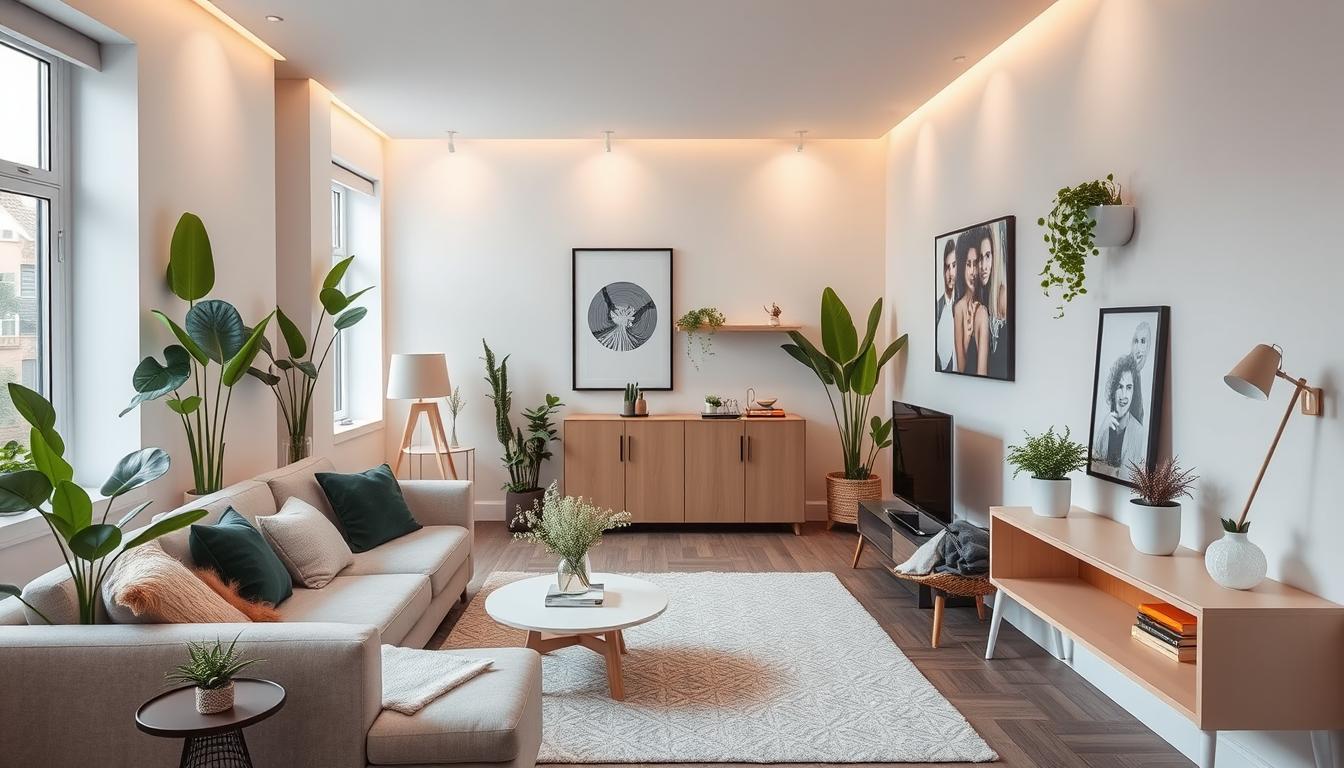
Are you tired of feeling cramped in your cozy abode? Fear not, my friends! In this comprehensive guide, I’ll share creative and innovative home decor ideas for 2025 that are perfect for small spaces. From embracing minimalism to maximizing vertical space, you’ll discover practical solutions to transform your compact living area into a stylish and functional oasis. Are you ready to unlock the secrets of making the most of your limited square footage?
Key Takeaways
- Discover innovative decor ideas to make the most of small spaces
- Learn how to embrace minimalism and declutter for a serene ambiance
- Explore multifunctional furniture solutions to maximize limited space
- Uncover tips to enhance the illusion of spaciousness through clever design
- Discover ingenious storage solutions for compact living
Embracing Minimalism: The Art of Less is More
In the realm of small space design, embracing minimalism is a transformative approach. By paring down to the essentials and letting go of clutter, we can create an oasis of serenity and functionality within our homes. The principle of “less is more” can work wonders in maximizing the potential of compact living areas.
Decluttering for Serenity
The first step in embracing minimalism is to embark on a decluttering journey. Eliminating unnecessary items and streamlining our possessions can have a profound impact on our mental well-being. A decluttered space not only looks visually appealing but also fosters a sense of calm and focus. By consciously curating our belongings, we can free up valuable square footage and cultivate a more serene environment.
Multifunctional Furniture Solutions
When space is at a premium, thoughtfully selected multifunctional furniture can be a game-changer. Pieces that serve dual or even triple purposes, such as a coffee table with hidden storage or a sofa with built-in chaise lounges, allow us to maximize the functionality of every square inch. By investing in these versatile furnishings, we can create a harmonious and efficient living space that caters to our diverse needs.
| Minimalist Approach | Traditional Approach |
|---|---|
| Decluttered and serene living space | Cluttered and overwhelming environment |
| Multifunctional furniture for optimal efficiency | Single-purpose furniture taking up valuable space |
| Intentional curation of belongings | Accumulation of unnecessary items |
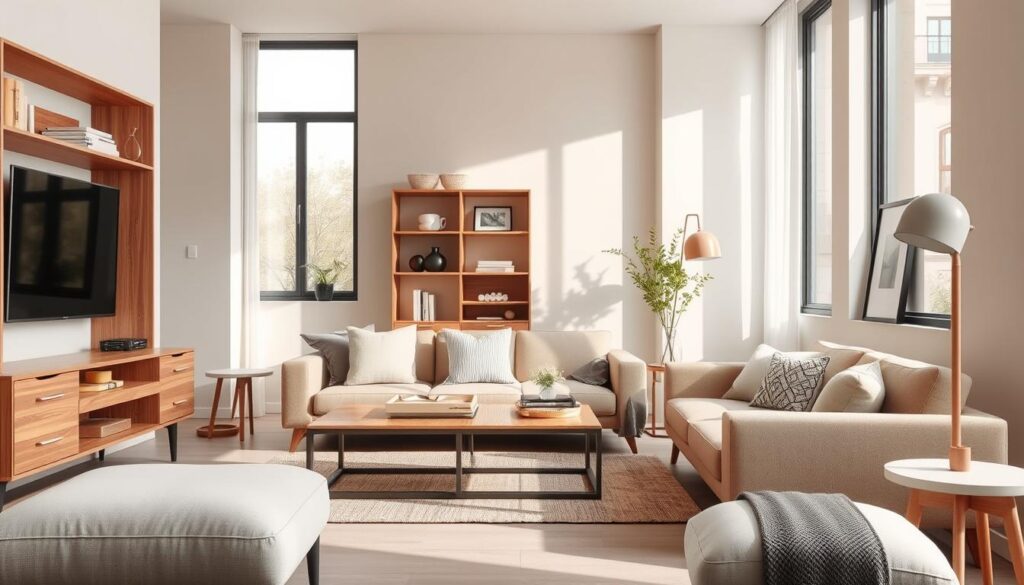
By embracing minimalism and leveraging the power of decluttering and multifunctional furniture, we can transform our small spaces into harmonious and serene havens. The art of “less is more” empowers us to create living environments that are not only aesthetically pleasing but also conducive to our well-being and productivity.
Maximizing Vertical Space
When square footage is limited, learning to utilize vertical space becomes crucial. As a home decor enthusiast, I’ve discovered innovative ways to make the most of your walls and ceilings, from shelving systems to hanging storage solutions. By thinking creatively and prioritizing small space solutions, you can transform your home into a stylish and functional oasis, despite the constraints of limited floor area.
One of my favorite strategies for maximizing vertical space is to install floating shelves. These versatile units not only provide ample storage but also add a sleek, modern touch to your decor. Arrange them in various heights and configurations to create a dynamic, visually interesting display for your books, plants, and other decorative items.
Another smart solution is to utilize wall-mounted storage units, such as pegboards or slim, modular shelving systems. These allow you to organize your belongings vertically, freeing up valuable floor space while keeping frequently used items within easy reach.
- Invest in a well-designed, space-saving shelving system that can be customized to fit your specific needs.
- Explore hanging baskets, wall-mounted racks, or even a vertical garden to make the most of your vertical real estate.
- Consider adding a floating desk or a wall-mounted work surface to create a functional home office in a small space.
| Vertical Space Maximization Strategies | Benefits |
|---|---|
| Floating Shelves | Provide ample storage, add visual interest, and create a sleek, modern aesthetic. |
| Wall-Mounted Storage Units | Organize belongings vertically, freeing up floor space and keeping items within easy reach. |
| Hanging Baskets and Racks | Utilize otherwise wasted vertical space to store items or create a vertical garden. |
| Wall-Mounted Work Surfaces | Establish a functional home office or workspace in a small space. |
By embracing the power of vertical space and exploring these innovative small space solutions, you can transform your home into a visually captivating and highly efficient living environment, despite the limitations of square footage.
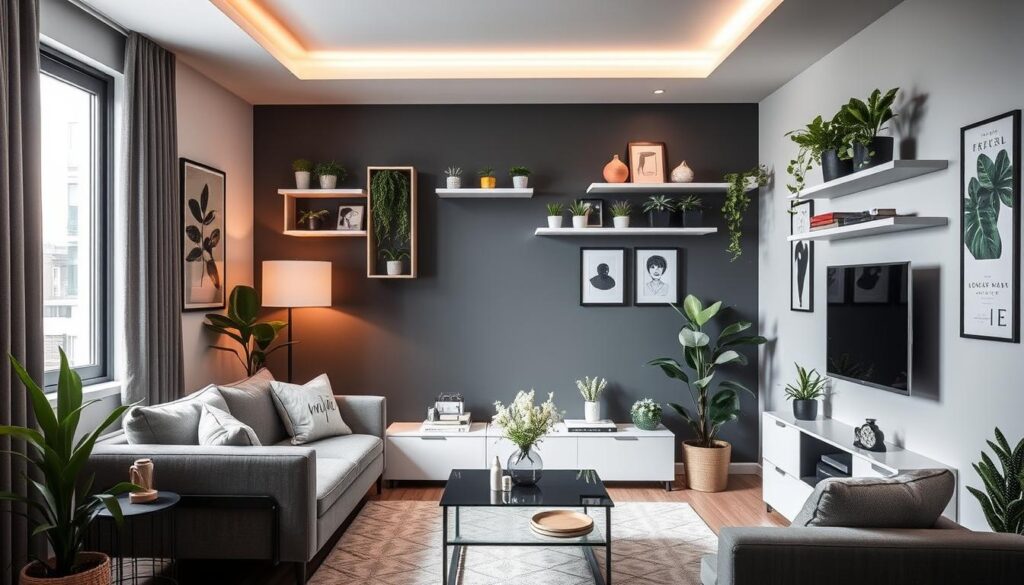
Color Schemes That Enhance Spaciousness
When it comes to decorating small spaces, the right color choices can make a significant difference in creating a sense of openness and airiness. By carefully selecting light and airy colors as well as strategic accent colors, you can transform even the most cramped quarters into a visually expansive and inviting haven.
Light and Airy Hues
Opt for color schemes that feature soft, muted tones and natural light. Pale blues, soft greens, and delicate shades of white and cream can instantly make a space feel more spacious and tranquil. These light and airy colors reflect light, creating the illusion of a larger, brighter room.
Clever Use of Accent Colors
While embracing a light and airy palette, strategically incorporate accent colors to add visual interest and depth. Pops of vibrant hues, such as a bold yellow or deep teal, can be used sparingly on accent pieces or in small doses to prevent the space from feeling overwhelming. These accent colors draw the eye, creating a sense of balance and harmony within the overall color scheme.
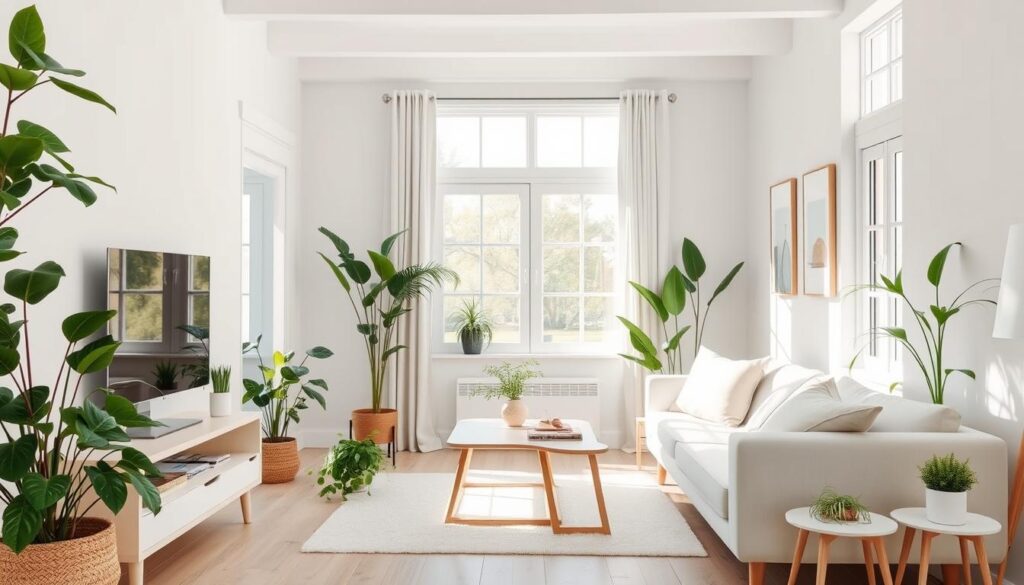
Remember, the key to maximizing the perception of space is to find the perfect balance between light and airy colors and thoughtful accent colors. By embracing this approach, you can create a small space that feels open, inviting, and effortlessly stylish.
Home Decor: Creating Illusions of Space
When you’re working with a small living space, it’s essential to get creative with your home decor to create the illusion of a larger, more expansive area. Two powerful techniques I’ll explore in this section are the strategic placement of mirrors and the strategic use of lighting.
Strategic Mirror Placement
Mirrors are a powerful tool for making a room feel more open and airy. By strategically positioning mirrors, you can create the illusion of depth and enhance the sense of spaciousness. Place mirrors across from windows to reflect natural light and make the space feel brighter. You can also use mirrors to visually expand narrow hallways or create the impression of a larger bathroom.
Lighting Tricks for Depth
Lighting is another key element in creating the illusion of space. Opt for fixtures that cast a soft, diffused glow rather than harsh, directional lighting. Layered lighting with a combination of ambient, task, and accent lighting can make a room feel more expansive. Uplighting can also give the impression of higher ceilings, while strategic placement of wall sconces can elongate the perceived depth of a space.
By mastering the art of illusions of space, mirror placement, and lighting, you can transform even the most compact of homes into a haven that feels open, airy, and inviting.
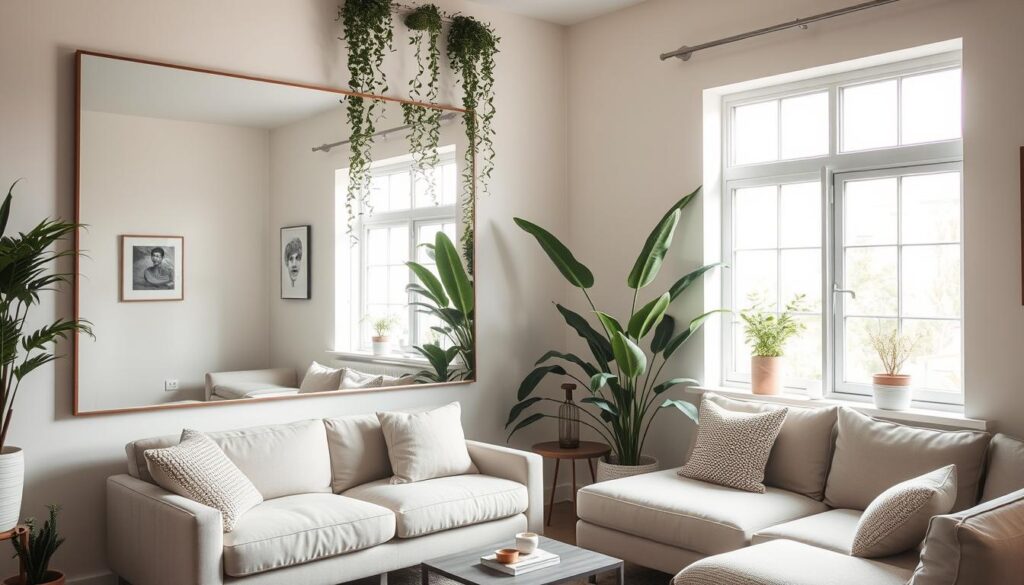
Compact Living: Ingenious Storage Solutions
Living in a small space can be both a challenge and an opportunity to get creative with storage solutions. As an avid proponent of compact living, I’ve discovered a treasure trove of ingenious ways to maximize every inch of your home and keep it clutter-free.
One of my favorite storage ideas is the use of multifunctional furniture. Ottomans with built-in compartments, beds with under-the-bed drawers, and coffee tables with hidden storage compartments are all fantastic options to consider. These versatile pieces not only provide valuable storage but also seamlessly integrate into your living space without taking up additional square footage.
Another clever solution is to utilize vertical space. Wall-mounted shelves, hanging baskets, and even repurposed ladders can transform unused wall areas into organized display and storage hubs. This strategy allows you to maximize your square footage by going up instead of out.
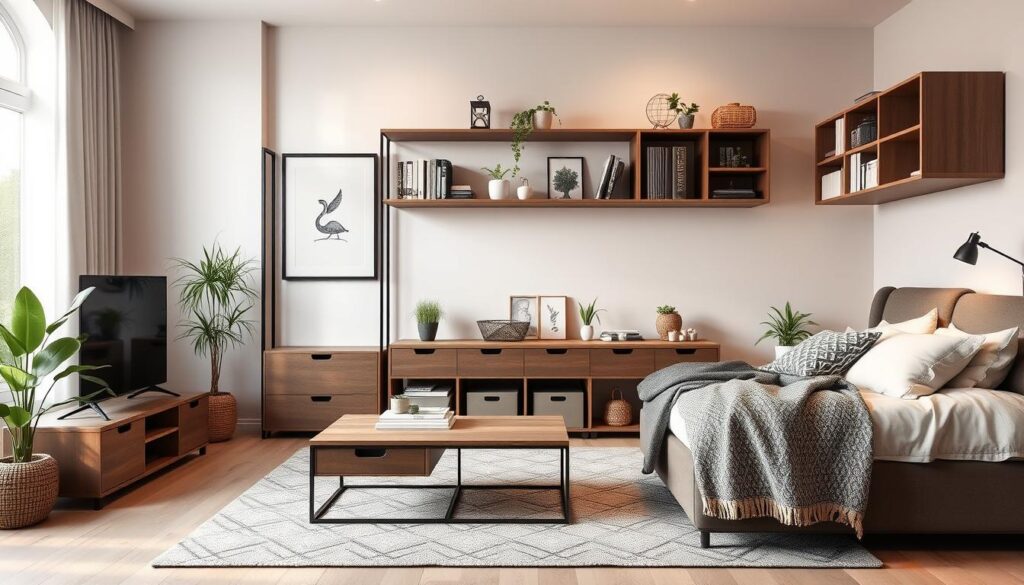
For those seeking a more minimalist approach, built-in cabinetry and custom-designed storage units can be game-changers. These tailored solutions utilize every nook and cranny, creating a seamless and cohesive aesthetic while keeping your belongings neatly tucked away.
Ultimately, the key to effective storage solutions in compact living is to think creatively and be open to unconventional ideas. With a bit of imagination and the right approach, you can turn your small space into a harmonious and well-organized haven.
Multipurpose Furniture Designs
In the realm of small-space living, multipurpose furniture has emerged as a game-changer. These innovative designs offer versatility, maximizing the utility of every square inch within your home. From convertible pieces that seamlessly transition between functions to ingenious space-saving solutions, the world of multipurpose furniture is brimming with practical and stylish options.
Convertible Pieces
Convertible furniture is the epitome of clever design. These multi-tasking wonders can effortlessly transform to suit your evolving needs. Think of a sofa that unfolds into a guest bed, or a coffee table that doubles as a dining surface. By investing in these convertible pieces, you can streamline your small-space layout and bid farewell to the clutter of single-use furnishings.
Space-Saving Innovations
When it comes to maximizing limited square footage, space-saving furniture is a lifesaver. From vertical storage units that reach toward the ceiling to ottomans with hidden compartments, these design-savvy pieces optimize every inch of your home. Wall-mounted shelves, fold-away desks, and nesting tables are just a few examples of the ingenious space-saving innovations that can breathe new life into your compact abode.
| Multipurpose Furniture Type | Key Features | Benefits |
|---|---|---|
| Convertible Sofa Bed | – Transforms from a sofa to a guest bed – Compact and space-saving design |
– Accommodates overnight visitors – Frees up floor space when not in use |
| Transforming Coffee Table | – Expands to provide additional surface area – Conceals storage compartments |
– Adaptable to dining or work needs – Keeps clutter out of sight |
| Wall-Mounted Shelving | – Utilizes vertical space – Offers customizable configuration |
– Frees up floor space – Provides ample storage without bulkiness |
By incorporating these multipurpose furniture designs into your small-space home, you can create a harmonious, clutter-free environment that seamlessly adapts to your evolving needs. Embrace the power of convertible pieces and space-saving innovations to transform your humble abode into a functional, stylish haven.
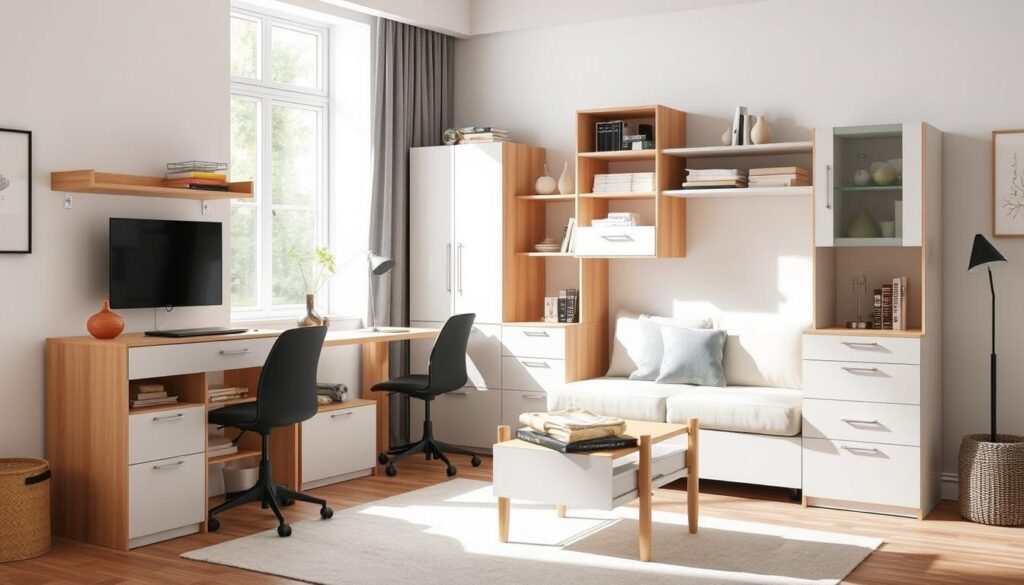
Embracing Minimalist Aesthetics
Minimalism has emerged as a popular design philosophy, particularly for those seeking to create harmonious and visually appealing small spaces. By embracing minimalist aesthetics, you can transform your compact home into a serene oasis that exudes a sense of calm and sophistication.
At the heart of minimalist design lies the principle of “less is more.” This approach encourages the thoughtful curation of essential elements, prioritizing functionality and clean lines over excessive ornamentation. In the context of small space design, this minimalist mindset can be especially beneficial, helping to create a sense of spaciousness and clarity.
To achieve a minimalist aesthetic in your small space, focus on the following key elements:
- Decluttering and Streamlining: Carefully assess your belongings and eliminate anything that doesn’t serve a specific purpose or bring you joy. This process of decluttering can instantly create a more serene and uncluttered environment.
- Neutral Color Palette: Opt for a neutral color scheme, such as shades of white, gray, or beige, which can help to visually expand the space and create a sense of calm.
- Minimalist Furniture: Choose furniture with clean, simple lines and a neutral palette. Avoid bulky or ornate pieces that can visually weigh down a small space.
- Thoughtful Accessories: Incorporate a few carefully selected accessories, such as a statement piece of art or a sleek vase, to add visual interest without overwhelming the space.
By embracing minimalist aesthetics in your small space, you can create a serene and harmonious environment that feels both stylish and functional. Remember, the key is to focus on quality over quantity, allowing the beauty of simplicity to shine through.
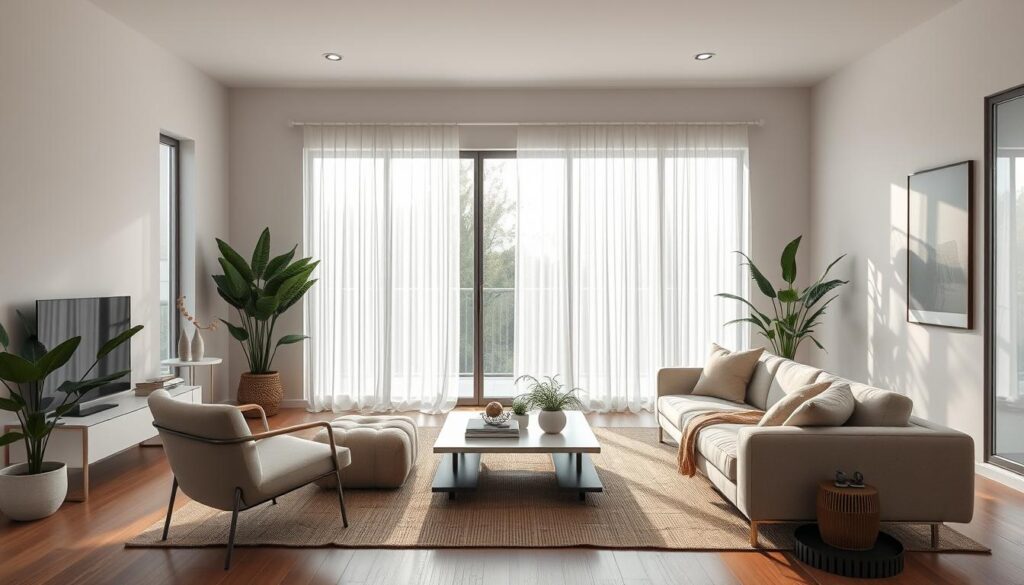
Small Space, Big Style: Personalizing Your Haven
When it comes to home decor, small spaces can present a unique set of challenges. However, with the right approach, you can transform your compact abode into a personalized oasis that reflects your individual style. The secret lies in strategic personalization, thoughtful gallery wall curation, and the incorporation of striking accent pieces.
Curated Gallery Walls
Gallery walls are an excellent way to add visual interest and a touch of personality to any room, even in a small space. The key is to curate a carefully selected collection of art, photographs, and other meaningful items that tell your unique story. Arrange them in a visually appealing layout, playing with different frame sizes, orientations, and spacing to create a cohesive and visually striking display.
Unique Accent Pieces
In a small space, every piece of furniture and decor carries significant weight. Embrace the opportunity to incorporate unique accent pieces that instantly elevate the ambiance and add a personal touch. Whether it’s a statement vase, a vintage armchair, or a one-of-a-kind wall hanging, these carefully selected items can transform your compact home into a truly remarkable and personalized haven.
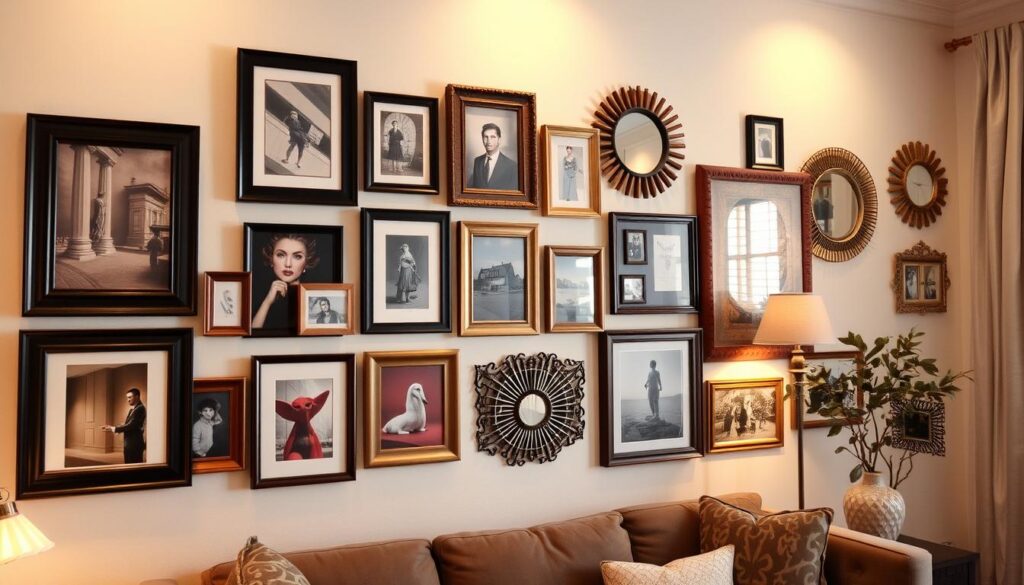
Remember, personalization is the key to creating a small space that feels truly your own. By curating thoughtful gallery walls and incorporating distinctive accent pieces, you can infuse your compact home with a sense of style and individuality that defies its size.
Rethinking Floor Plans for Optimal Flow
When it comes to small space living, the layout and flow of your floor plan can make all the difference. By rethinking your floor plans, you can unlock the full potential of your compact abode and create a harmonious, functional living environment.
One key aspect to consider is zoning. Dividing your small space into distinct zones, such as a sleeping area, work zone, and living room, can help establish clear boundaries and improve the overall flow. Strategically positioning furniture and using multifunctional pieces can seamlessly delineate these zones without making the space feel cramped.
Another tactic is to maximize vertical space. By incorporating floor-to-ceiling shelving, wall-mounted storage, and even lofted beds, you can free up valuable floor space and create a more spacious, airy feel. Vertical solutions not only optimize your small space layout but also provide ample storage to keep your home clutter-free.
Lastly, pay close attention to the traffic flow in your small space. Ensure that pathways are clear and unobstructed, allowing for easy movement throughout the room. Strategically placing furniture and avoiding tight corridors can create a seamless, comfortable flow, making your small space feel larger and more inviting.
“The key to a successful small space floor plan is finding the right balance between functionality and aesthetics.”
By rethinking your floor plans and focusing on zoning, vertical space, and traffic flow, you can transform your compact home into a harmonious, efficient, and visually appealing oasis. Embrace the challenge of small space living and unlock the full potential of your living environment.
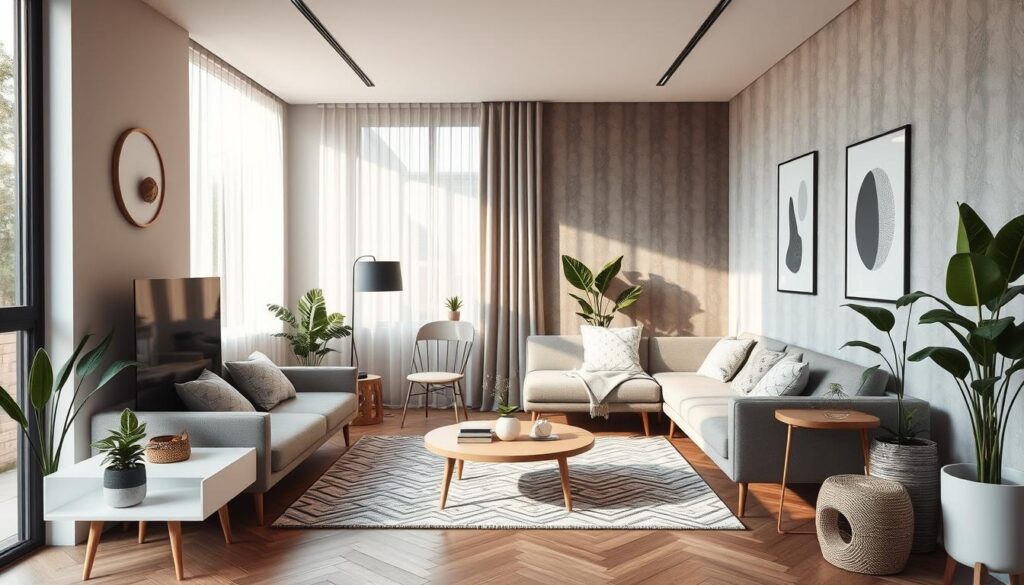
Natural Elements for a Serene Ambiance
Creating a calming and rejuvenating living environment is essential, especially in small spaces. By incorporating natural elements into your home decor, you can cultivate a serene atmosphere that nourishes the mind and soul. Let’s explore the wonders of natural elements, greenery, and the principles of biophilic design.
Incorporating Greenery
Bringing the outdoors in through the strategic placement of plants and foliage can work wonders for your small space. Lush greenery not only adds a refreshing visual element but also helps to purify the air and promote a sense of tranquility. Consider placing a statement plant in a prominent location or arranging a collection of smaller potted plants on shelves or windowsills to create a captivating, nature-inspired display.
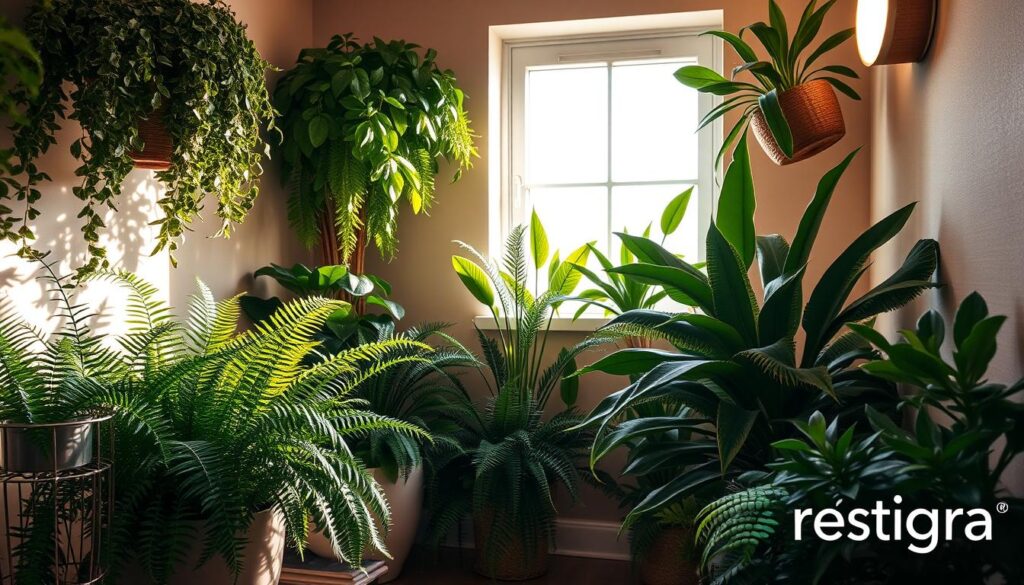
Biophilic Design Principles
The concept of biophilic design is rooted in the idea that humans have an innate connection to the natural world. By incorporating natural elements into your home, you can tap into this primal affinity and create a space that nourishes your well-being. Consider incorporating natural materials, such as wood, stone, or natural fibers, into your decor to enhance the connection to the outdoors.
- Utilize natural lighting and allow for ample views of the outside, if possible.
- Introduce natural textures and patterns, like woven baskets or organic-shaped accessories.
- Incorporate calming water features, such as a small tabletop fountain, to promote a soothing ambiance.
By embracing the power of natural elements, greenery, and biophilic design, you can transform your small space into a serene oasis that nourishes the senses and soothes the soul.
Sustainable and Eco-Friendly Home Decor Choices
As we look towards the future, it’s essential to consider the environmental impact of our home decor choices. Fortunately, there are a wealth of sustainable and eco-friendly options available that can help you create a beautiful and responsible living space. From recycled materials to natural fibers, the possibilities are endless when it comes to decorating your home in an environmentally-conscious way.
One of the key aspects of sustainable home decor is the use of renewable and recyclable materials. Look for furniture, accessories, and textiles made from bamboo, cork, or reclaimed wood, which offer a unique and eco-friendly aesthetic. Additionally, explore the wide range of sustainable fabrics, such as organic cotton, linen, and hemp, which not only look stunning but also have a lower environmental footprint.
Another important consideration is the energy efficiency of your home decor. Opt for energy-saving LED lighting, which not only reduces your carbon footprint but also saves you money on your utility bills. Incorporate natural lighting whenever possible, and consider using sustainable insulation materials to regulate the temperature in your living spaces.

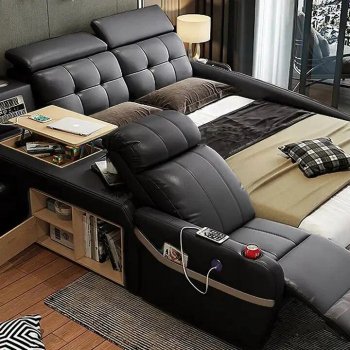
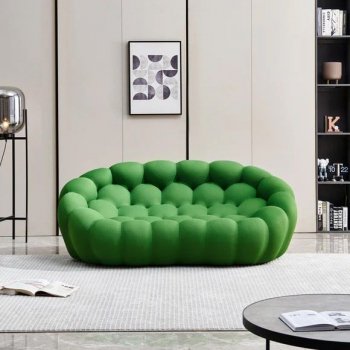
















Leave a comment